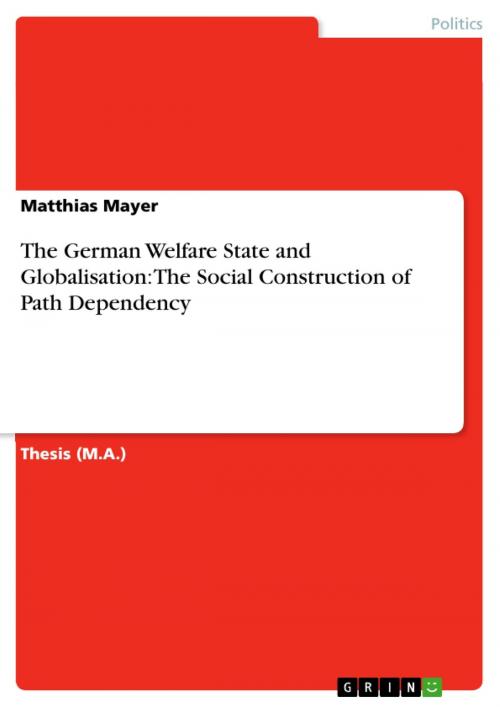The German Welfare State and Globalisation: The Social Construction of Path Dependency
Nonfiction, Social & Cultural Studies, Political Science, International, Foreign Legal Systems| Author: | Matthias Mayer | ISBN: | 9783638533898 |
| Publisher: | GRIN Publishing | Publication: | August 13, 2006 |
| Imprint: | GRIN Publishing | Language: | English |
| Author: | Matthias Mayer |
| ISBN: | 9783638533898 |
| Publisher: | GRIN Publishing |
| Publication: | August 13, 2006 |
| Imprint: | GRIN Publishing |
| Language: | English |
Thesis (M.A.) from the year 2005 in the subject Politics - Political Systems - Germany, grade: sehr gut, London School of Economics, 60 entries in the bibliography, language: English, abstract: Economic globalisation seems to have intensified the claims that an extensive national welfare state is no longer sustainable under high exposure to global competition. However, the evidence for significant welfare dismantlement in Germany is missing. In this dissertation, I endeavour to analyse, why globalisation does not seem to have had any significant impact on the German welfare state in terms of serious downwards reform. I contend that the actual impact of economic globalisation on the national welfare state depends a great deal, on how it is interpreted domestically. Hence, I would like to regard the impact of globalisation not only as an exogenous force, but also as a result of what national policy makers, media, electorate, etc. interpret it to entail. In other words, although globalisation really seems to strain existing welfare structures, policy makers still have a considerable scope how to react to these pressures. For my endeavour, I introduce a historical institutionalist framework of path-dependency, which I confront with a social constructivist framework. Prima facie, the path-dependency theorem seems to hold for the German welfare state. However, I claim that a social constructivist angle is able to illuminate how the institutional constraints propagated by the path-dependency thesis can be overcome. Institutional constraints continue to impede welfare reform in German only because the German political elite failed to socially construct the imperative of reform in public discourse, leaving the great majority of the German population unwilling to accept fundamental cutbacks in social benefits. I argue that the Schröder administration attempted to legitimise cutbacks in social services through referring to exogenous pressures of globalisation. In addition, the media discusses the increased need for welfare state reform in the context of globalisation. Although, there seems to be a trend of mounting acceptance of welfare reform among the German population, the general level for support of such measures remains low. I attempt to show that the notion of globalisation on its own appears unable socially construct the public acceptance of serious welfare state reform. Hence, the most likely scenario for the near future of the German welfare state seems the absence of reform until the prolonged economic crisis legitimises significant transformations of the current system.
Thesis (M.A.) from the year 2005 in the subject Politics - Political Systems - Germany, grade: sehr gut, London School of Economics, 60 entries in the bibliography, language: English, abstract: Economic globalisation seems to have intensified the claims that an extensive national welfare state is no longer sustainable under high exposure to global competition. However, the evidence for significant welfare dismantlement in Germany is missing. In this dissertation, I endeavour to analyse, why globalisation does not seem to have had any significant impact on the German welfare state in terms of serious downwards reform. I contend that the actual impact of economic globalisation on the national welfare state depends a great deal, on how it is interpreted domestically. Hence, I would like to regard the impact of globalisation not only as an exogenous force, but also as a result of what national policy makers, media, electorate, etc. interpret it to entail. In other words, although globalisation really seems to strain existing welfare structures, policy makers still have a considerable scope how to react to these pressures. For my endeavour, I introduce a historical institutionalist framework of path-dependency, which I confront with a social constructivist framework. Prima facie, the path-dependency theorem seems to hold for the German welfare state. However, I claim that a social constructivist angle is able to illuminate how the institutional constraints propagated by the path-dependency thesis can be overcome. Institutional constraints continue to impede welfare reform in German only because the German political elite failed to socially construct the imperative of reform in public discourse, leaving the great majority of the German population unwilling to accept fundamental cutbacks in social benefits. I argue that the Schröder administration attempted to legitimise cutbacks in social services through referring to exogenous pressures of globalisation. In addition, the media discusses the increased need for welfare state reform in the context of globalisation. Although, there seems to be a trend of mounting acceptance of welfare reform among the German population, the general level for support of such measures remains low. I attempt to show that the notion of globalisation on its own appears unable socially construct the public acceptance of serious welfare state reform. Hence, the most likely scenario for the near future of the German welfare state seems the absence of reform until the prolonged economic crisis legitimises significant transformations of the current system.















